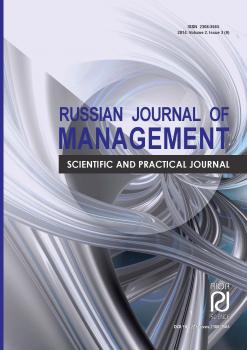The main vectors of development of the national model of corporate governance are considered. Its institutional features are determined. The specifics of the agency problem resolution coordinates “principal — agent” activity and structure of the board of directors of Russian companies are studied. Features of non-financial reporting and corporate transparency companies are disclosed as well as the basic contradiction of the formation and development of the Russian model of corporate governance is determined.
institutional environment, model of corporate governance, agency problem, board of directors, stakeholders, non-financial reporting, corporate transparency, Russian model of corporate governance
Глобальные факторы рискогенности внешней среды хозяйствования воздействуют на национальные модели корпоративного управления, обуславливая динамику внешних и внутренних управленческих механизмов, а также влияя на качество корпоративного управления и на информационную прозрачность компании.
Рискогенность функционирования российских компаний определяется не только внешними финансовыми условиями, но и обусловлена институциональными факторами формирования и развития отечественной модели корпоративного управления, ее структурой, функционированием совета директоров, корпоративной отчетностью, эффективностью взаимодействия всех участников корпоративного управления.
1. Opros rossiyskikh chlenov soveta direktorov. Megatendentsii na povestke dnya. 2014 [Survey of Russian board members. Megatrends on the agenda. 2014]. URL: http://www.pwc.ru/boardsurvey.
2. Galazova S.S. Sovremennyy rynok: transformatsionnaya sud´ba bazovogo zvena [The modern market: the fate of transformational basic level]. Vladikavkaz, 2014.
3. Avdasheva S.B., Golikova V.V., Yakovlev A.A., Sugiura F. External relationships of Russian corporations: [Preprint]. Institute of Economic Research. Discussion Paper Series, 2007, no 37.
4. Mishurova I.V. Panfilova E.A. Korporativnoe upravlenie [Corporate management]. Moscow, Dashkov i K Publ.; Akademtsentr Publ., 2010.
5. Natsional´nyy doklad po korporativnomu upravleniyu [National Report on Corporate Governance]. Issue 5. Moscow, The National Council on Corporate Governance, 2012.
6. Panfilova E. A. Comparative evaluation of the quality of the Russian institutional environment. Molodoy uchenyy [Young Scientist], 2013, no 4, p. 271-275.
7. Issledovanie korporativnoy prozrachnosti rossiyskikh kompaniy, 2013 [Study of corporate transparency of Russian companies]. URL: http://transparency2013.downstream.ru/#/ru.
8. Val´kovich O.N., Zolotareva Yu.O. Economic and legal aspects of corporate management in Russia. Teoriya i praktika obshchestvennogo razvitiya [Theory and practice of social development], 2014, no 1, p. 393-395.
9. Natsional´nyy doklad po korporativnomu upravleniyu [National Report on Corporate Governance]. Issue. 6. Moscow, The National Council on Corporate Governance, 2013.
10. Jensen M. & Meckling W. Theory of the firm: Managerial behavior, agency cost and ownership structure. Journal of Financial Economics, 1976, no 3, pp. 305-360.
11. Jensen M., Murphy K. J. CEO Incentives: It´s Not How Much You Pay, But How. Harvard Business Review, 68(3), p. 138-153.
12. Teren´eva A. “Norilsk Nickel” is paying the price for peace. Vedomosti, 2013, no 29 (3291). URL: http://www.vedomosti.ru/newspaper/article/400601/nornikel_rasplachivaetsya_za_mir
13. Dolgopyatova T.G. The evolution of the structure and dynamics of ownership concentration. Ocherki modernizatsii rossiyskoy promyshlennosti: povedenie firm [Essays on modernization of Russian industry: the behavior of firms] / Edited by B.V. Kuznetsov. Moscow, High School of Economics, 2014. P. 143-166.
14. The draft of the new Corporate Governance Code on February 13, 2014. URL: http://government.ru/news/10482/#nabi. (in Russian)
15. The draft State programme of the Russian Federation “Federal property” (for the period 2013-2015). URL: http://www.consultant.ru/law/hotdocs/20746.html.














